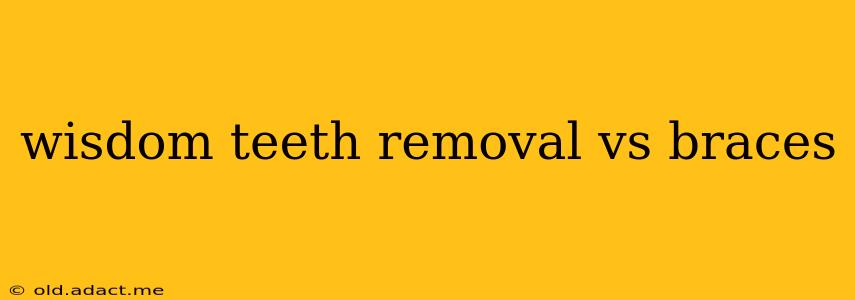Wisdom Teeth Removal vs. Braces: Which Comes First? A Comprehensive Guide
The decision of whether to get wisdom teeth removed before or after braces is a common dilemma for many teenagers and young adults. Both procedures address distinct oral health concerns, and the timing of each can significantly impact the overall treatment process and outcome. This comprehensive guide explores the factors to consider when deciding the order of wisdom teeth removal and braces.
What are Wisdom Teeth, and Why Might They Need Removal?
Wisdom teeth, also known as third molars, are the last teeth to erupt in the mouth, typically appearing between the ages of 17 and 25. However, not everyone develops wisdom teeth, and some may only partially erupt or remain completely impacted (buried beneath the gum line). Removal is often necessary when:
- Impacted Wisdom Teeth: Impacted teeth can cause pain, infection (pericoronitis), cysts, or damage to adjacent teeth.
- Crowding: Wisdom teeth can push against existing teeth, causing crowding and misalignment, potentially exacerbating orthodontic issues.
- Difficulty Cleaning: Partially erupted wisdom teeth are difficult to clean, increasing the risk of cavities and gum disease.
What is the Purpose of Braces?
Braces are used to straighten teeth and correct malocclusion (improper bite). They address various orthodontic problems, including:
- Overbite: Upper teeth significantly overlap lower teeth.
- Underbite: Lower teeth overlap upper teeth.
- Crossbite: Upper and lower teeth don't align correctly.
- Crowded Teeth: Teeth are too close together.
- Gaps Between Teeth: Spaces exist between teeth.
Wisdom Teeth Removal Before Braces: Pros and Cons
Pros:
- Prevents Crowding: Removing wisdom teeth before braces can prevent them from interfering with orthodontic treatment and potentially reducing treatment time.
- Reduces Risk of Complications: Removing impacted wisdom teeth eliminates the risk of infection or damage during orthodontic treatment.
- Easier Access for Orthodontist: The removal of wisdom teeth provides the orthodontist with better access to the teeth for alignment.
Cons:
- Added Expense and Recovery Time: This adds another procedure and recovery period before starting braces.
- Potential for Post-Surgical Swelling: Swelling after wisdom teeth removal might temporarily delay the start of braces.
Braces Before Wisdom Teeth Removal: Pros and Cons
Pros:
- Streamlined Treatment: This approach avoids the additional recovery time and expense associated with separate procedures.
Cons:
- Potential for Damage During Removal: Removing wisdom teeth after braces could potentially damage the braces or require adjustments.
- Increased Risk of Complications: Braces may make it more challenging to remove impacted wisdom teeth.
- Compromised Orthodontic Results: Wisdom teeth erupting after orthodontic treatment could shift teeth, compromising the alignment.
How Do I Decide Which Procedure Comes First?
The best approach depends on several individual factors, including:
- The position and condition of the wisdom teeth: Are they impacted? Do they show signs of infection or damage?
- The severity of the orthodontic problem: How extensive is the malocclusion?
- The orthodontist's recommendation: The orthodontist will consider the specific details of your case to provide the best advice.
- Overall health: Any existing medical conditions might influence the decision.
What if my wisdom teeth are impacted and don't need removal?
If your wisdom teeth are impacted but asymptomatic (causing no problems), your orthodontist may advise monitoring them during orthodontic treatment. They may only recommend removal if complications arise during or after the orthodontic treatment.
How long does recovery take after wisdom teeth removal?
Recovery time varies depending on the complexity of the procedure. It can range from a few days to several weeks, with most individuals experiencing minimal discomfort after the first week.
What are the costs associated with wisdom teeth removal and braces?
The costs of both procedures vary depending on location, complexity of the procedures, and insurance coverage. It's crucial to discuss costs with both the oral surgeon and orthodontist upfront.
Ultimately, a consultation with both an oral surgeon and an orthodontist is crucial. They can assess your individual situation and recommend the optimal approach to ensure the best possible outcome for your oral health. Don't hesitate to ask questions and express your concerns to make an informed decision.
